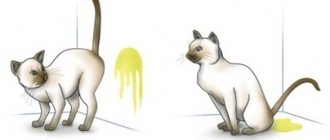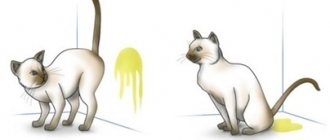The article has been revised and certified
Dobrovolskaya Daria Vyacheslavovna
student of veterinary medicine LNUVM and BT named after. S. Z. Grzhitsky
Ask a Question
Many cat owners have to deal with territory marking. For cats, this behavior is a way of communication, but for people it is a real disaster, (or even a whole disaster), because of which, unfortunately, the cat can be surrendered to a shelter or even euthanized.
You are probably wondering: how to quickly and effectively deal with this problem? We'll come back to this later, but first, let's make sure that we all understand correctly why cats spray liquid?
Sometimes by marking their territory, cats try to draw your attention to the problem.
Why is this happening
Leaving special marks should not be confused with normal urination. If in the second case the animal relieves itself naturally in a specially designated place (tray), then marking the territory is a special ritual with the help of which the fluffy wants to say that he is the owner here. As a rule, purrs choose any furniture, walls, interior or entrance door, flower pots, etc. for this purpose. Animals living outside leave “marks” on tree trunks, bushes, plants, and fences. Do not rush to scold a cat for bad behavior; he is guided by instincts, genetics and a self-preservation mechanism.
Representatives of the feline genus have an excellent sense of smell; the odors left behind serve as a clear, readable identifier of the individual. But it’s one thing when a cat marks territory, what if a cat does it? This also happens, although much less frequently; the female also leaves her “calling cards”, marking the boundaries of her zone, declaring who is in charge in the house. Animals, being under stress, strive to protect themselves from outside encroachment and imaginary enemies.
Cats on your property
A cat is a cute and fluffy creature. If, of course, it is yours. Strange cats that regularly wander into the garden area cause a lot of trouble. Despite the benefits that cats bring, for example, they catch pests such as mice, they are considered to be the most dangerous creatures for the garden after rodents.
Cats are great at getting rid of pests, but they themselves also pose a danger to the garden.
Trouble in the garden
Among the troubles caused by cats in the garden are the following:
- Flowerbeds and beds are used by visiting cats as a toilet. Cat feces are not fertilizer at all; they can completely destroy your favorite flowers or vegetables. Cats are territorial animals, they instinctively mark their possessions with urine, and this will also not benefit the garden.
- Cats love to roll around in cool, lush greenery. And it doesn’t matter whether it’s carrot tops or a flower bed with gladioli.
It can be very difficult to drive a cheeky cat out of the area
- In addition, cats like to use the bark of fruit trees as a scratching post.
- Cats are excellent hunters of game birds. Summer residents who attract birds to their plots are unlikely to like this. Big cats wreak havoc in a chicken coop just as well as a fox.
When do the first cat marks appear?
For the first time, owners are faced with the problem of how to wean a cat from marking territory in the house after six months, by which time the fluffies become sexually mature. The onset of this period depends on the breed:
- large individuals (ragdoll, maine coon) - closer to 12 months;
- British - by 8 months;
- Siamese - by 5-6 months.
Personality, genetic predisposition, home environment, the presence of other pets and other factors matter. In some cases, you may be lucky and the question of how to wean a cat from marking will not become relevant. If the animal has a calm character, puberty occurs without incident, you may not see any odorous traces on interior items, doors or walls.
Invalid methods
How to stop a cat from crapping in the entrance, so as not to harm the animal and not engage in useless activities, is of interest to any resident. To do this, you must adhere to the following rules:
- Do not use bleach, as some cats love this smell, and it can be dangerous for humans.
- Do not use a strong chemical odor, as it can cause intoxication in animals and allergic (and asthmatic) reactions in humans.
- Do not use perfume, as the smell of cologne, combined with ammonia, will become a real horror for those who enter the entrance. In addition, it quickly disappears and cats do not react to it.
- You should not punish the animal very strictly, this will not lead to a positive result. It is necessary to have a “serious conversation” at the site of the immediate “offense”, but without using forceful methods.
A very important factor is the immediate response to cat urine in the form of cleaning. Once urea turns into crystals, it will be almost impossible to deal with it. After each moisturizing, the smell will appear again.
The main condition for getting rid of discomfort in the entrance is to understand your neighbors. You can fight with your own methods or simply raise money and call specialists. Then there will be no trace of the problem. And build a cozy house for the animals, which will be located outside the entrance area. Then people and their smaller brothers will have fun and comfort living together.
How often do cats leave marks?
Here everything is individual, if females mark only during estrus, males can dirty the apartment all year round (usually in spring and autumn), causing significant inconvenience and discomfort to the owners.
On average, the frequency of leaving urine marks is about 2-3 per day, and “quiet periods” may be observed. But, unfortunately, it also happens that a purr marks at least 10 times in just one day. Here you need to decide what to do to prevent the cat from marking immediately.
What causes spraying?
- medical problems
- desire to mate
- changes in daily routine
- dirty trays
Each of the points will be discussed in detail in the following paragraphs. However, first we must clarify that both male and female cats mark territory. But those who are sterilized do it much less often. However, 10% of spayed males and 5% of spayed females also continue to spray surfaces, reports Cornell University College of Veterinary Medicine.
Fluffy marks things and shoes with urine
What should you do if your cat marks everywhere, including shoes and even clothes? Surely you were not prepared for such a development of events when you got a pet.
The fact is that the imperious purr does not care where his scent marks will be; the main goal is to inform competitors and surrounding people that there is no place for a stranger in this territory. As for shoes, they exude the aroma of human body and sweat. The animal will try in every way to drown out extraneous odors, replacing the aromatic bouquet of shoes that is unacceptable to it with urine marks.
Weaning a young pet from tagging
After purchasing a kitten, you need to understand that from the age of six months it can begin to mark. Because of this, it is necessary to know in advance how to deal with this problem before it occurs. If it is extremely difficult to wean an adult pet without surgery, then a kitten can be dealt with without castration.
If the cat begins to mark the territory, it is necessary to be strict and show who is the owner of the room. Kittens are very susceptible to roughness and can easily be left psychologically traumatized by mishandling.
If you don’t do much with the kitten and don’t show interest or attention to it, it may start putting marks on its owner’s bed and things. You can correct the situation with games, affection and care.
Animal marks a person
In certain cases, formed behavioral instincts force the cat to urinate on the owner. In this way, the purr declares its rights, making you a member of the imaginary cat clan. On the one hand, you should be proud that you are accepted as one of their own, on the other hand, this is unacceptable and everything must be done to stop the cat from marking the apartment and you.
It also happens that a cat perceives its owner as a competitor; this is especially typical for animals that were picked up on the street at puberty. Fuzzies, obeying natural instinct, continue to fight for themselves, mistaking you for a competitor.
Where do cats mark most often?
Despite the strong, unpleasant aroma of cat urine, it is not easy to find the specific place where the little villain urinated. Typically, the crime scene is walls, cabinet fronts, furniture, a refrigerator, wallpaper, the owner’s clothes or shoes, or another pet’s sleeping place.
Some fluffies choose unusual, hard-to-reach places that a good sense of smell is not enough to identify. A UV lamp or flashlight with LED beams will help in the search; traces of urine are highlighted with a bright yellowish-neon spot.
Prevention or how to stop a cat from marking in the house in advance
Uncastrated animals begin their “dirty deeds” no earlier than six months of age; until this period, living together with a kitten will not cause inconvenience. Problems begin after reaching sexual maturity, at which time the male’s leadership qualities begin to appear. Unfortunately, it is not possible to prevent the development of natural changes in the body.
At the same time, it is necessary to pay attention to the education of the animal:
- show your child who is boss in the house, do not allow permissiveness;
- pay attention to the fluffy, do not leave him alone for a long time;
- Make sure your cat has toys and play with him.
Do not use force against the cat under any circumstances, do not show aggression, do not throw objects at it, do not raise your voice. Harsh parenting methods will provoke an aggressive reaction, the purr will mark more diligently, thereby trying to protect itself. The only effective preventive measure is competent education and timely hygiene measures.
Tag prevention
Experienced breeders and veterinary specialists recommend to cat owners
the following measures to prevent cat marks:
- Castration is the most effective method of prevention, provided that the operation to remove the gonads is done before the onset of puberty.
- Education is a less effective method in the fight against marks. However, if the pet does not naturally have strong male leadership qualities, then proper education can play a key role in the prevention of cat marks.
- Permanent residence in the house of a person of the opposite sex. Having an unsterilized cat does not guarantee that the cat will stop marking its territory, and there is a big problem associated with offspring.
Unfortunately, there is no 100% method of preventing a cat from leaving marks. You can combat the natural manifestations of instinct in an uncastrated animal by resorting to educational and hygienic measures.
What to do if your cat marks
The peak of “activity” occurs in the autumn-autumn period, this is explained by hormonal changes in the cat’s body. Zoologists associate the strengthening of sexual instincts with an increase in the duration of daylight hours, as well as the peculiarities of the biological rhythm of the animal.
In search of an answer to the question of what to do to prevent a cat from marking, owners are trying non-standard solutions. One of these can be called keeping an animal during an “exacerbation” in a darkened room. If the “irreparable” has already happened, it is necessary to clean the stained area, thoroughly wash the furniture and walls, apply a disinfectant and repellent spray.
Veterinarians do not recommend using detergents containing bleach; bleach vapors are dangerous for people and animals. Regular baking soda, a weak solution of vinegar, or special products that neutralize the pungent odor of urine will do.
At worst, if you don’t have a special spray on hand, you can use aromatic oils, eau de toilette, incense sticks, perfume or air freshener.
Invalid methods
How to stop a cat from crapping in the entrance, so as not to harm the animal and not engage in useless activities, is of interest to any resident. To do this, you must adhere to the following rules:
- Do not use bleach, as some cats love this smell, and it can be dangerous for humans.
- Do not use a strong chemical odor, as it can cause intoxication in animals and allergic (and asthmatic) reactions in humans.
- Do not use perfume, as the smell of cologne, combined with ammonia, will become a real horror for those who enter the entrance. In addition, it quickly disappears and cats do not react to it.
- You should not punish the animal very strictly, this will not lead to a positive result. It is necessary to have a “serious conversation” at the site of the immediate “offense”, but without using forceful methods.
A very important factor is the immediate response to cat urine in the form of cleaning. Once urea turns into crystals, it will be almost impossible to deal with it. After each moisturizing, the smell will appear again.
The main condition for getting rid of discomfort in the entrance is to understand your neighbors. You can fight with your own methods or simply raise money and call specialists. Then there will be no trace of the problem. And build a cozy house for the animals, which will be located outside the entrance area. Then people and their smaller brothers will have fun and comfort living together.
With the onset of summer, many people move to their summer cottages and, of course, take their pets with them. In the heat, no cat wants to sit in a stuffy apartment, but here there is freedom, green grass and sunshine. And everything would be fine, but the fluffy beauties and handsome men begin to walk throughout the entire dacha village and go to the toilet where they like. What if your neighbor has not one, but five cats, and all of them have taken a liking to the children’s tent that is located on your property? The “fragrance” marks are eaten away so much that soon it will be impossible to play in it. A separate discussion is about the piles in the garden beds. All this causes understandable dissatisfaction and a completely logical question: “How to keep cats away from the site?”
How to remove traces of urine in an apartment
Even when you have decided what to do to prevent the cat from marking the house, you need to be prepared that the chosen measures may not give immediate results. Be patient, remember that the cat does nothing to spite you, he is guided by natural instincts that cannot be resisted.
List of what you will need in the fight for cleanliness in the house:
- detergents;
- sprays and liquids for cleaning carpets;
- odor neutralizers that wean the animal off marks.
Of course, you can use more affordable means - vinegar solution, hydrogen peroxide, citric acid, but their effectiveness is much lower, and besides, you risk ruining the upholstery of an expensive sofa.
DIY natural repellent for cats
You can make an effective remedy yourself in a few minutes using available materials.
- Add peppermint leaves to the water, let it steep for a few minutes, put it in a bottle, or use it to wash floors.
- Collect peelings of citrus fruits - orange, lemon, grapefruit, scatter behind furniture, in the corners of rooms, near the sofa. You can cut off the zest, pour boiling water over it, and leave. The result is a repellent spray with universal action. The product stops cats from scratching and marking. Similarly, an ode is used, into which the juice of one fruit should be squeezed.
- Grind the spices and scatter them in a path in places that need to be protected from the cat. This is usually done when she has settled into climbing into flower pots. The aroma irritates the receptors, the animal begins to sneeze and runs away.
- Mix chopped rosemary, lavender, and cinnamon in equal proportions. Fill with water, leave for a day, pour into a spray bottle. The spray can be used to treat any surface. It is worth noting that rosemary can only be used for a short time, as it is toxic for cats.
- Mix apple cider vinegar and water in equal proportions. Used as a spray, liquid for washing floors, furniture, doors. In addition, you can add essential oils of citronella, lavender, lemongrass, and peppermint.
You will have to use the products often until the cat develops the correct reflex.
In addition to homemade repellents, there are special preparations to repel cats. They contain natural substances and are safe for people to use in residential areas. The active substances, as a rule, are essential oils and plant extracts.
What to do to prevent a cat from marking - use folk remedies
As you know, folk “proven” methods exist in solving any issue; weaning a cat from a bad habit is no exception. Some owners use the scent of citrus to influence their pet's behavior; for others, the most common laundry soap helps.
Try treating the cat's favorite places with ammonia, put wormwood or a bag of aromatic spices there, turmeric, mustard powder, red and black pepper will do. Fluffies do not like substances that emit a pungent odor, so with a high degree of probability, they will avoid this place, or simply find a new one, depending on their luck.
How to get cats out of the basement
In urban areas, cats usually settle in the basement, it is warm there, people appear infrequently.
- Chopped onions and garlic (lemon or tangerine peel) scattered around the basement will quickly wean them off.
- Repellent solution: stir a few tablespoons of ground black pepper in 500 ml of hot water, let it brew, pour into a spray bottle, and spray in the corners.
- Spraying with vinegar will cause cats to go into shock.
In the basement, cats do not bother anyone, but if the basement is dirty and damp, cats can get sick:
- fungal diseases
- dermatological diseases
- chlamydia.
Plus they can carry rabies and other diseases. This danger appears if there are rats in the basement, which cats hunt. Furry hunters often die because rats are poisoned with poisons to which they are immune.
In this case, the responsibility of the housing office is not to exterminate cats, but to bring the basement premises into decent shape. Treatment against insects and rodents will prevent the spread of all the unpleasant things listed above.
Cats are distrustful and will not be picked up, so stories about infected children have no basis.
As for worms, this is a common problem that is only remotely related to cats. Most children become infected with worms, and prevention of infestation must be carried out regularly, regardless of the presence of cats somewhere in the basement.
We correct the cat's behavior with special means
Cats often cause mischief in the house due to an unstable emotional state, which can be caused by moving, the appearance of a new pet, frequent quarrels, the birth of a child, and other factors. In this case, you need to help the cat survive stress with the help of sedatives.
It is advisable to choose plant-based homeopathic remedies that do not have a sedative effect. Regarding the use of hormonal contraceptives, their effectiveness has not been proven in the fight against feline marking in the home.
Your cat may spray urine for a number of medical problems.
Any time your pet suddenly changes its behavior, it is important to first rule out medical causes. This is also true for marking territory, as it can be caused by physical discomfort caused by stress. This means that an animal may spray urine as a result of stress. In addition, a health problem sometimes causes pain, which causes the cat to adopt a certain spraying position when urinating in order to relieve it. It is also possible that sick cats do not mark their territory, but simply pee in other places.
For example, inflammation of the urinary tract can increase the frequency and need to urinate. This may cause the cat to go outside the litter box. Due to diabetes, kidney and thyroid disease, cats may drink more and urinate more often. Of course, old age can also prevent your pet from getting to the litter box in time. This is why cat owners should always take their pets to the vet to ensure there are no health problems causing behavior changes.
Analyzes and tests will show whether the cause of this behavior is illness
A physical examination, urine test, and other diagnostic tests will show whether there is a medical reason for the behavior.
Problem: The cat has changed its habits and urine is found in the house. The urine has a different smell or there is blood in it.
How to fix it: Consult your veterinarian as soon as possible. It is important to determine what caused the change in your cat's behavior. If the problem is not related to a medical condition, your veterinarian will help guide you on next steps and may prescribe medications for anxiety. An animal behavior expert can also evaluate the problem and help you develop a treatment plan.
How to stop a cat from marking the door
Quite often, purrs begin to mark their territory immediately upon entering the house, that is, they leave drops of urine on the front door. To discourage your pet from damaging the door leaf, thoroughly wash the surface, remove the unpleasant odor, and apply a product with a cat-repellent scent.
Additionally, you can scatter strong-smelling spices near the mat, put a slice of lemon, or leave a cotton swab dipped in ammonia.
Industrial products
Industrial cat repellents are mainly presented in the form of chemical aerosols and sprays. Their functions are varied. For example, protecting shoes, furniture, walls, floors and even the most secret corners in the house from an unwanted place for a pet to defecate. Sprays are also used to eliminate the unpleasant odor of cat urine.
It is best to choose products with natural composition:
- Water is the main component of a chemical spray or aerosol.
- Eucalyptus (lemon, lavender, castor, rue) oil – gives the compound a characteristic pungent odor that repels pets.
- Glycerin is an emulsifier - an auxiliary substance for mixing immiscible liquids. For example, water and essential oil.
The controversial component in the spray or aerosol is methylchloroisothiazolinone. This substance belongs to the group of synthetic preservatives that destroy bacteria, fungi and mold. It is a powerful allergen and toxic to cells of the immune system of animals and humans. The presence of this component in deterrents can cause severe allergic reactions and dermatitis.
What to do if other people's cats are marking your territory
If your local area is regularly attacked by yard cats, each of whom considers it their duty to mark it, you can install an ultrasonic repeller near the house.
A special device produces sounds that are harmless to humans and animals and repel uninvited guests. Please note that this solution is suitable for those who do not have their own pets, otherwise your cat will also experience discomfort.
Industrial cat repellents
Modern industrial cat repellers perform two functions:
- protect furniture, walls, household appliances and shoes from unwanted cat attention;
- scare cats away from places where they do not want to poop.
Typically, such products are produced in the form of sprays, which are aimed at educational work with a cat. Their use is most effective in enclosed spaces; spraying in open areas is pointless. On the street, these products quickly lose their properties. Special repellers differ from home remedies in that they not only drive away the cat, but also neutralize the odors of cat marks.
If the cat marks the territory near the house
You already know what to do when a cat marks in the apartment, it’s time to figure out what to do with a pest that regularly does “dirty things” on the street.
The solution should be comprehensive, try to redirect the pet’s attention, use a standard set of repellents.
For distraction you can:
- install a gaming complex;
- buy a new toy;
- use veterinary drugs to correct behavior.
Organizing a place to relieve yourself outdoors can also help. If you need to use a special tray for your home, you can organize a sandy mound in the fresh air, planting aromatic grass around it that is attractive to cats.
How to use for repelling?
The need to use odors that are unpleasant for cats against them is due to a number of reasons, including:
- going to the toilet in the wrong place;
- excessive interest in indoor flowers with possible negative consequences for them;
- increased interest in human food;
- "occupation" of a specific territory with attacks on those who enter or lay claim to it.
To get rid of the unpleasant odor of urine that remains in the room after going to the toilet in the wrong place, you can use the following remedies.
- Vodka - all surfaces are wiped with it, which allows you to quickly eliminate the unpleasant cat odor, but another problem arises - the presence of a persistent alcohol aroma, which can only be removed by prolonged ventilation.
- Potassium permanganate solution - this product should be concentrated enough to rid the house of an unpleasant odor, but if the crystals do not completely dissolve in water, the substance will leave stains, especially on fabric surfaces.
- Lemon juice – you can make it from water and lemon or dilute it into a powder form. This product helps remove unwanted odor and prevents the furry animal from repeating pranks in the same place.
- Vinegar solution - dilute with water in a ratio of 1:3 and wipe hard surfaces. If you need to apply it to fabrics, it is better to use a spray bottle and remove excess moisture with paper napkins or towels.
- Soda - to get rid of the smell of urine completely, you need to sprinkle the area of the cat's pranks with soda and pour hydrogen peroxide over it, leaving it like that for some time. You can apply this procedure at night, and then thoroughly wipe the contaminated area. It is not advisable to use this option on fabric surfaces, as the product will leave streaks.
If your pets start climbing on the table or walking along the window with indoor flowers, you must immediately take measures to stop such behavior. In the case of flowers, you can lay out orange peels on the windowsill or add zest to the soil. A good deterrent would be to use the feces of feline enemies - foxes and coyotes. If we are talking about a table, then you can use perfumes or essential oils to treat the surface. In addition, you can leave the moistened sponge on the surface.
In some cases, it is possible to teach a pet to behave correctly, and in some, the opposite effect is obtained, since the cat develops panic attacks and other mental disorders that can harm others.
Another problematic situation that summer residents or those who have a vegetable garden may encounter is the excessive interest of their cat or other people’s animals in the land. Cats associate a garden with a litter box, so they can relieve themselves there, doing it often, which is unlikely to please the owner. To deal with this problem, you can use several tactics.
- Fertilize and moisten the garden area, which will discourage cats from traveling through it, much less going to the toilet there, because they are clean animals and will not get into the dirt.
- It is worth inspecting the area for places through which cats enter the garden and eliminating them. If you don’t find any, you should make a small ravine near the fence and fill it with gravel, which cats really don’t like.
- If you can’t fight the animals, then you can allocate a certain area for them where they will spend time without spoiling the harvest in the remaining beds. To achieve this result, it is worth fencing off a small area, filling it with sand and irrigating it with a small amount of valerian, which will immediately attract animals and distract them from the rest of the territory.
- To scare away unwanted guests, you can plant those plants that emit an unpleasant and pungent aroma. This is hot pepper or coleus dog.
Any fight against pranks should be moderate, without excesses and harm to animals, so you should be as careful as possible in choosing means to scare away cats in each specific case.
If cats shit in the entrance
If the marks left in the apartment cause inconvenience only to the owners, an unpleasant smell in the front door is a collective problem, affecting all residents. To eradicate the problem, it is necessary to castrate all males who live in nearby areas.
The solution will kill several birds with one stone - you will prevent the growth of the population of stray animals, solve the issue of unpleasant odor, and get rid of cats meowing under the windows. Install a door with a locking lock at the entrance to prevent uninvited guests from entering. Otherwise, the solution is standard - thorough cleaning, treating surfaces with repellents and sprays to neutralize odors.
Effective help
In some regions it is not possible to obtain an ultrasound device. All that remains is to try all the listed methods in the hope that one of them will be effective. If the situation gets out of control, and the neighbor’s pets don’t want to leave you alone, you need to use something that scares cats away from your summer cottage with a 100% guarantee. Today there are a huge number of products on the market that are marketed as cat repellents. Some are designed for indoor use, others for outdoor use.
There are two main forms of these products: granules and aerosol. The second one shows itself best if you need to solve the problem of cat litter in the apartment. The spray is sprayed in places chosen as a toilet. In other words, you will have to spray everything except the tray. This form is not very convenient for a garden, although some walk around the perimeter every day and cultivate bushes and hedges. But it would be better to use granular formulations. They create a longer lasting effect and are easier to use. Simply scatter the granules around the perimeter of the garden and beds, as well as in places that cats have already eyed as a toilet.











